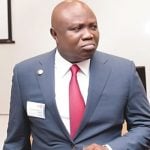
NIQS’s suggestion was at the backdrop of more than N3 trillion required yearly to meet Nigeria’s infrastructural deficit and which is not achievable, based on the current Nigeria’s economic reality, hence, the need to fiddle with idea of project financing “as best alternative option”.
This option was brought to the table at the just-concluded two-day specialised workshop organised by the Lagos State chapter of the Institute, with the theme: “Finance and Development of Capital Projects-emerging solutions.”
In her address, NIQS President, Mrs Mercy Iyortyer, while expressing reservation over the tradition of government financing capital projects, which are usually from allocations from fiscal budgets alone, without exploring contribution of finance from other sources like the private sector has not been helpful.
“This trend is not sustainable especially, in view of the present economic situation of the country that could be traced to falling oil prices, high exchange rate, double digit inflation rate, unstable foreign exchange rate, low budget performance and liquidity constraints on the fiscal budget, among others.”
The situation, she further noted, has been compounded by commercial banks, that have made themselves short-term lenders- a development that is not suitable for long term investment projects, arguing that this is why it has become crucial that alternative sources of investments with larger and more patient pools of capital are incentives to participate in infrastructure financing.
Iyortyer urged the need for the stakeholders, especially as professionals, to consider emerging solutions to these challenges and to benchmark with other countries such as China and Dubai which have had success stories in this area, noting that the private sector was expected to become increasingly involved in the creation of financing solutions to develop Nigeria’s frail infrastructure.
Although she appreciated the fact that project finance in the country was still in its infancy, coupled with the attendant pressing challenges in this regard, positive trends, she believed, are beginning to emerge.
Notwithstanding, the NIQS boss observed that the progress made so far in this direction has provided a strong foundation for hope.
Quantity surveyors, she explained, have an understanding of the measurement of cost and value, including the necessary combination of financial analytical skills and market knowledge to rise to the occasion required for capital project finance and development.
At the end of the event, a communiqué issued by the institution bordered on sustainability of project financing, given the present economic pressures, which was listed to include falling oil prices, high exchange rate, double digit inflation rate, unstable foreign exchange rate, low budget performance and liquidity constraints on the fiscal budget.
The communiqué also noted that with the understanding of the measurement of cost and value among others, quantity surveyors would lead the way in the quest to ensure private sector financing of capital projects.
WATCH TOP VIDEOS FROM NIGERIAN TRIBUNE TV
- Relationship Hangout: Public vs Private Proposals – Which Truly Wins in Love?
- “No” Is a Complete Sentence: Why You Should Stop Feeling Guilty
- Relationship Hangout: Friendship Talk 2025 – How to Be a Good Friend & Big Questions on Friendship
- Police Overpower Armed Robbers in Ibadan After Fierce Struggle





